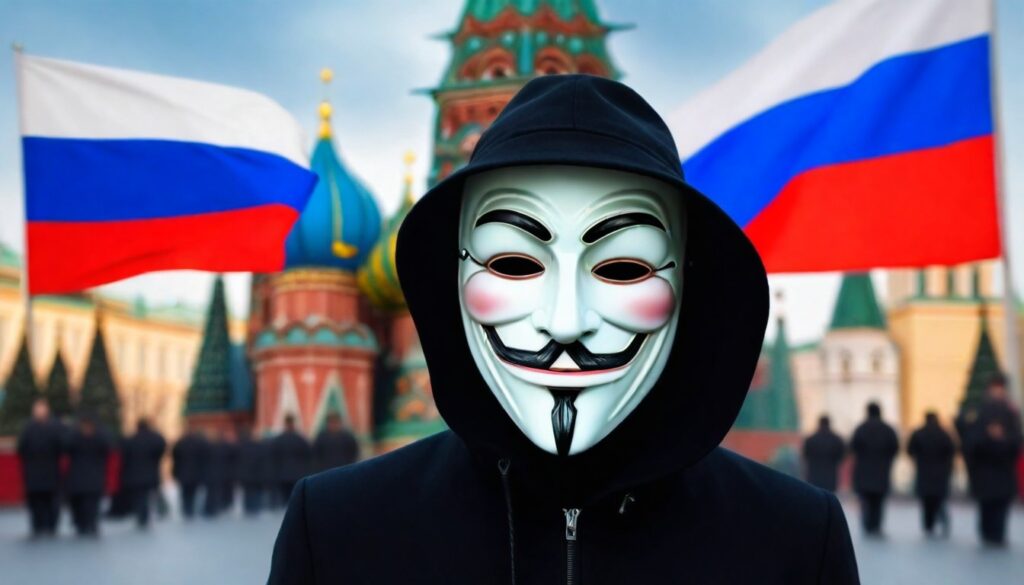The emergence of Anonymous, a loosely associated international network of activist and hacktivist entities, as a formidable player in the cyber realm, has raised significant questions about the impact such groups can have against nation-states. The group’s declaration of a cyber war against Russia in response to various geopolitical tensions has attracted global attention, stirring debates on the effectiveness of non-state actors in influencing state policies through digital means. This exploration seeks to unpack the complexities surrounding Anonymous’s capabilities, strategies, and the broader implications of their actions against a technologically sophisticated adversary like Russia.

The Nature of Anonymous
Understanding the effectiveness of Anonymous’s cyber operations against Russia requires a grasp of the group’s unique structure. Anonymous is a decentralized network with no formal hierarchy, allowing it to rapidly mobilize global support for various causes. This agility enables the group to launch coordinated cyber-attacks against targets with relatively short notice, a strategy known as “hacktivism.” The group’s operations range from simple denial-of-service (DoS) attacks to sophisticated breaches of confidential databases, aimed at disrupting, exposing, or embarrassing their targets.
Cyber Operations Against Russia
In its cyber war against Russia, Anonymous has claimed responsibility for several high-profile attacks. These include taking down government websites, hacking into Russian state television to broadcast Ukrainian songs and messages, and leaking sensitive documents purported to belong to the Russian government. Such actions are emblematic of Anonymous’s strategy to undermine the informational and operational capabilities of its adversaries, aiming to create a sense of vulnerability and disruption.
Measuring Effectiveness
Evaluating the effectiveness of Anonymous’s cyber campaigns against Russia is complex. On one hand, the immediate impacts of their operations can be significant. Disrupting government websites and leaking sensitive information can cause embarrassment to the Russian state, signal global support for Ukraine, and potentially expose wrongdoing. Moreover, these actions serve to raise awareness and influence public opinion, both within Russia and internationally.
On the other hand, the long-term strategic impact of these operations remains uncertain. Russia possesses one of the world’s most sophisticated cyber defenses and has a robust information control apparatus. The ability of Anonymous to inflict lasting damage or significantly alter Russian policies or actions through cyber means alone is debatable. Furthermore, the decentralized nature of Anonymous, while providing agility and anonymity, also means that its actions can be unpredictable and vary in sophistication and impact.
The Cybersecurity Landscape
The involvement of groups like Anonymous in geopolitical conflicts highlights the evolving landscape of cybersecurity, where non-state actors can play significant roles. It raises questions about the balance of power in the digital age and the potential for cyber to serve as a leveller in asymmetrical conflicts. However, it also underscores the challenges of attribution, accountability, and regulation in cyberspace, as the actions of hacktivist groups can sometimes escalate conflicts or have unintended consequences.
Legal and Ethical Considerations
The activities of Anonymous against Russia also bring to the fore critical legal and ethical issues. While some view their actions as a form of digital protest against aggression and oppression, others criticize them as illegal and potentially harmful. The lack of clear international norms governing state and non-state cyber activities complicates the assessment of such operations’ legitimacy and morality.
Conclusion
Anonymous’s cyber war against Russia exemplifies the growing significance of digital battlegrounds in contemporary geopolitical conflicts. While the group’s ability to challenge state actors like Russia showcases the power of collective digital activism, the effectiveness of such efforts in achieving long-term strategic objectives remains nuanced. It highlights the dual nature of cyberspace as both a tool for empowerment and a potential source of instability, emphasizing the need for a more nuanced understanding of the interplay between technology, politics, and ethics in the digital era.
In conclusion, while Anonymous’s actions against Russia have demonstrated the potential for non-state actors to disrupt and challenge state power in the digital domain, the broader implications of such cyber wars are complex. They reflect the evolving dynamics of international relations in the age of information technology, where the lines between warfare, activism, and cybercrime are increasingly blurred.
i want to be one
Keep up the good work. #support Ukriane #hack the russians